
ACTA ZOOLOGICA ACADEMIAE SCIENTIARUM HUNGARICAE
Scope & Guideline
Fostering Excellence in Zoological Research
Introduction
Aims and Scopes
- Taxonomy and Systematics:
The journal emphasizes the description and classification of new species across various taxa, including insects, mollusks, amphibians, and arachnids. This contributes to the broader understanding of biodiversity and the evolutionary relationships among species. - Biogeography:
Research published often includes studies on the distribution of species in different geographical regions, enhancing knowledge of how geographical factors influence biodiversity. - Ecological Studies:
The journal also covers ecological research, including habitat use, migration patterns, and the ecological roles of different species, which is crucial for conservation efforts. - Faunistic Surveys:
Contributions often involve faunistic surveys that document species presence in specific regions, which are essential for biodiversity assessments and conservation planning. - Molecular and Genetic Studies:
Recent papers have included molecular studies, particularly focusing on mitochondrial DNA diversity, which aids in understanding genetic variation and evolutionary processes.
Trending and Emerging
- Molecular Phylogenetics:
There is an increasing trend towards the use of molecular techniques to study phylogenetic relationships, as seen in the focus on mitochondrial DNA variation in species such as the Asian tiger mosquito. This reflects a broader trend in zoological research towards genetic analysis. - Taxonomic Revisions and New Species Descriptions:
The journal is witnessing a surge in taxonomic revisions and the description of new species, indicating a robust ongoing effort to document biodiversity, especially in underexplored regions. - Climate Impact Studies:
Emerging research is increasingly addressing the impacts of climate change on species distributions and behaviors, highlighting the relevance of ecological studies in the context of global environmental changes. - Behavioral Ecology:
There is a growing interest in behavioral ecology, particularly studies focusing on vocalization and movement patterns in various species, which contribute to understanding species interactions and adaptations. - Urban Ecology Research:
Research exploring the effects of urbanization on species, including habitat usage and adaptation strategies, is becoming more prominent, reflecting the need to understand biodiversity in changing landscapes.
Declining or Waning
- General Ecology without Taxonomic Context:
There seems to be a reduction in general ecological studies that do not directly connect to taxonomy or species descriptions, indicating a potential shift towards more taxonomy-focused research. - Broad-Spectrum Conservation Studies:
Research articles that broadly address conservation issues without specific taxonomic focus are becoming less frequent, suggesting a more targeted approach in current publications. - Papers on Invasive Species:
Although previously a popular topic, there has been a noticeable decrease in papers specifically addressing invasive species and their impacts, reflecting a possible waning interest in this area.
Similar Journals
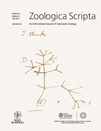
ZOOLOGICA SCRIPTA
Championing impactful studies in ecology and behavior.Zoologica Scripta, published by Wiley, stands as a distinguished journal within the fields of Animal Science and Zoology, Ecology, Evolution, Behavior and Systematics, Genetics, and Molecular Biology. With its inception dating back to 1971 and a convergence year extending to 2024, this journal consistently provides a platform for high-quality research, earning a Q1 ranking in two key categories and solid performance in additional fields, as evidenced by its significant Scopus rankings and impressive percentiles. Notably, it ranks 36 out of 490 journals in Animal Science and Zoology, placing it in the 92nd percentile. While Zoologica Scripta operates under a traditional access model, its rigorous peer-review process ensures that only the most impactful studies make their way into its pages. With a focus on advancing our understanding of biodiversity and evolutionary processes, this journal is indispensable for researchers, professionals, and students committed to the ongoing exploration of animal sciences and ecological studies.
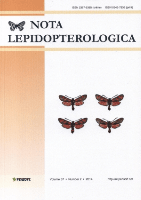
NOTA LEPIDOPTEROLOGICA
Fostering global collaboration in biodiversity research.NOTA LEPIDOPTEROLOGICA, an esteemed journal published by Pensoft Publishers, has been a cornerstone in the fields of Insect Science, Animal Science, Ecology, and Evolution since its inception in 1995, with a commitment to open access publication since 2014. Based in Sofia, Bulgaria, this journal serves as a vital platform for researchers and professionals alike, facilitating the dissemination of significant findings related to Lepidoptera and broader ecological interactions. With an impressive scope covering vital aspects of biodiversity and taxonomy, NOTA LEPIDOPTEROLOGICA holds a Q3 ranking in its categories according to the 2023 metrics and plays a crucial role in advancing our understanding of insect science. By fostering international collaboration among scholars, the journal not only emphasizes the ecological importance of Lepidoptera but also contributes to global conservation efforts, making it an indispensable resource for students and experienced researchers aiming to deepen their knowledge in these fields.
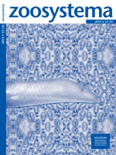
ZOOSYSTEMA
Catalyzing Knowledge in Animal ScienceZOOSYSTEMA is a prestigious academic journal published by PUBLICATIONS SCIENTIFIQUES DU MUSEUM, PARIS, specializing in the fields of Animal Science, Zoology, and Ecology. With a focus on advancing the understanding of biodiversity and evolutionary processes, this journal serves as a vital platform for researchers to disseminate significant findings and foster discussions within the scientific community. Boasting an impressive categorization in the Q2 Quartile rankings for both its primary fields, ZOOSYSTEMA is recognized for its impact and quality, as indicated by its notable positions in the Scopus rankings. While currently not Open Access, the journal provides essential insights and comprehensive reviews across its volumes published since 1998, making it a cornerstone in zoological and ecological research. Researchers, professionals, and students alike will find ZOOSYSTEMA an invaluable resource for understanding complex biological systems and their interrelations, contributing to informed conservation and management efforts globally.

ANIMAL BIOLOGY
Advancing Knowledge in Animal Science and EcologyANIMAL BIOLOGY is a distinguished journal published by BRILL, focusing on the dynamic fields of Animal Science and Zoology, as well as Ecology, Evolution, Behavior, and Systematics. With an ISSN of 1570-7555 and an E-ISSN of 1570-7563, this quarterly journal serves as a pivotal platform for researchers and professionals seeking to contribute to the understanding of animal biology across diverse ecological contexts. The journal is recognized with a 2023 Scopus ranking of #234 out of 490 in the Animal Science and Zoology category, placing it within the 52nd percentile, alongside a rank of #409 out of 721 in Ecology, marking a solid contribution to the field. Although it currently holds a Q3 quartile in both categories, its commitment to quality research and novel insights continues to bolster its significance within the academic community. The open access option coupled with its publication history from 2003 to 2024 ensures a wide dissemination of knowledge, drawing in a global audience of researchers, professionals, and students eager to explore the intricacies of animal biology. By promoting high-quality discussions and innovative studies, ANIMAL BIOLOGY plays an essential role in advancing the understanding of life sciences and the evolution of biodiversity.
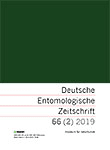
DEUTSCHE ENTOMOLOGISCHE ZEITSCHRIFT
Bridging Gaps in Insect Research and EcologyDEUTSCHE ENTOMOLOGISCHE ZEITSCHRIFT is a premier open access journal dedicated to the vibrant field of entomology, proudly published by Pensoft Publishers. With a rich publication history dating back to 1954, this journal serves as a vital platform for disseminating high-quality research in Animal Science, Zoology, and Insect Science, currently holding a commendable Q2 quartile ranking in these disciplines. The journal embraces the accessibility of science, having transitioned to an open-access model in 2014, ensuring that all readers can engage with cutting-edge findings and innovative studies without barriers. Researchers, professionals, and students alike will find the journal's breadth of topics—ranging from basic ecological studies to applied entomological research—essential for keeping abreast of developments that impact biodiversity and ecosystem functioning globally. With its commitment to supporting the entomological community, DEUTSCHE ENTOMOLOGISCHE ZEITSCHRIFT remains a cornerstone for anyone interested in the intricate world of insects.

ACTA ZOOLOGICA BULGARICA
Unveiling Nature's Secrets, One Study at a TimeACTA ZOOLOGICA BULGARICA is a prominent academic journal dedicated to advancing knowledge in the fields of Animal Science, Zoology, Aquatic Science, Ecology, Evolution, Behavior, and Systematics. Published by the Institute of Zoology, Bulgarian Academy of Sciences, this journal serves as an invaluable platform for researchers, professionals, and students to disseminate their findings and engage with contemporary issues in biodiversity and ecology. With an established history since its convergence in 2010 and an ongoing publication schedule through to 2024, the journal holds a Q4 category ranking in multiple disciplines, highlighting its role in fostering scholarly communication in these areas despite its recent entry into Scopus-indexed rankings. Although currently not an open-access journal, ACTA ZOOLOGICA BULGARICA remains a key resource for those interested in the latest research and developments, particularly within the ecological and zoological landscapes of Europe and beyond.
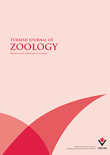
TURKISH JOURNAL OF ZOOLOGY
Bridging Research and Innovation in ZoologyThe TURKISH JOURNAL OF ZOOLOGY, published by the esteemed Tubitak Scientific & Technological Research Council Turkey, serves as a pivotal platform for the dissemination of research in the field of zoology and animal science. With an ISSN of 1300-0179 and an E-ISSN of 1303-6114, this journal has been contributing to the scientific community since its inception in 1994 and will continue to do so through 2024. Renowned for its scientific rigor, the journal holds a Q3 ranking in the 2023 category of Animal Science and Zoology, placing it within the prominent ranks of Scopus with a current percentile of 56, and an overall rank of 214 out of 490 in its domain. As an essential resource for researchers, professionals, and students, the journal prioritizes quality research, fostering knowledge exchange and collaboration among scholars worldwide. With its commitment to advancing understanding in zoological sciences, the TURKISH JOURNAL OF ZOOLOGY stands as a significant contribution to the global scientific dialogue.

PAKISTAN JOURNAL OF ZOOLOGY
Innovating animal biology insights from Pakistan and beyond.Pakistan Journal of Zoology, established in 1975 and published by the Zoological Society of Pakistan, is a pivotal resource in the field of zoology and animal science, contributing to the academic discourse and research advancements in the region. With an ISSN of 0030-9923, this journal strives to disseminate innovative research findings and scholarly articles that explore various facets of animal biology, ecology, and conservation. Although classified in the Q4 quartile within the animal science category, its commitment to providing a platform for emerging researchers makes it crucial for those in the zoological community. The journal covers a broad range of topics relevant to contemporary issues in zoology, promoting both local and international collaborations. Situated in Lahore, Pakistan, its contributions are vital for promoting biodiversity awareness and conservation efforts within the region. Accessible research outputs empower students and professionals alike to engage in critical discussions and applications within the disciplines of zoology and animal science.

Journal of Vertebrate Biology
Championing high-quality research in zoology.Journal of Vertebrate Biology, a reputable publication established by the Institute of Vertebrate Biology in the Czech Republic, serves as a vital platform for research across the fields of Animal Science and Zoology, Aquatic Science, and Ecology, Evolution, Behavior and Systematics. With its ISSN 2694-7684 and a commendable 2023 Q2 ranking in multiple categories, this open-access journal embraces innovative scientific inquiry and fosters academic discourse. The journal's commitment to disseminating high-quality research is reflected in its Scopus rankings, positioning it within the top quartile in several impactful areas. As it continues to converge its focus until 2024, researchers, professionals, and students alike are encouraged to engage with cutting-edge studies that advance our understanding of vertebrate biology. This publication stands out not only in its scholarly contributions but also in enhancing global awareness of biodiversity and conservation issues.

CONTRIBUTIONS TO ZOOLOGY
Exploring the Depths of Zoological KnowledgeCONTRIBUTIONS TO ZOOLOGY, published by BRILL, is a premier scholarly journal dedicated to advancing the field of zoological sciences. With an ISSN of 1383-4517 and an E-ISSN of 1875-9866, this journal serves as a vital platform for researchers, professionals, and students seeking to share their findings and insights related to animal science, ecology, evolution, and systematics. Recognized for its high academic standards, it ranks in the top quartile (Q1) for Animal Science and Zoology, and Q2 for Ecology, Evolution, Behavior, and Systematics, reflecting its significance and influence in the scholarly community. The journal has been consistently published since 1994 and continues to contribute pivotal knowledge that informs and shapes contemporary zoological research. Researchers can access the journal through traditional subscription models, ensuring broad dissemination of its impactful articles and studies. Contributions to Zoology plays an essential role in fostering collaboration and discussion within the zoological community in the Netherlands and beyond.